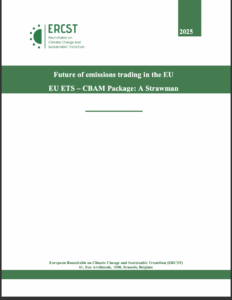
- This event has passed.
ERCST at COP29 – All Events
Below is the list of side events that ERCST organised, and participated in, during the COP29 that was held in Baku from 11 November to 22 November 2024.
1. Carbon Removals in international Carbon Markets
November 13, 2024 – 18:00-19:00, Baku time (15:00 Brussels time) | IETA Pavilion, COP 29 venue, Blue Zone
This is joint side event between ERCST and KAPSARC, with the participation of the Worlds Bank, EBRD and the Government of Norway, and will an opportunity to discuss the international carbon market dimensions of carbon removals. Some of the issues that will be covered:
• Paris Agreement Mechanisms: Role of carbon removals within the Paris Agreement, particularly under Article 6.2 and Article 6.4.
• Integration into Emissions Trading Systems: Explore conditions for the integration of carbon removal form the international markets in ETS around the world.
• Bilateral Agreements: Evaluation of bilateral agreements focusing on legal frameworks, mutual recognition of credits, storage agreements.
Speakers:
- Axel Pierru, KAPSARC
- Andrei Marcu, ERCST
- Chandra Sinha, World Bank
- Jan-Willem van de Ven, EBRD
- Ane Gjengedal, Norway Ministry of Petroleum and Energy
2. The Role of Climate Clubs in Addressing Trade Related Climate Measures
November 14, 2024 – 14:00-15:00, Baku time (11:00 Brussels time) | Trade and Investment House, Blue Zone
Trade-related climate measures play an increasing role in the climate policy field, and will continue to do so as we move towards net-zero. In recent years there has been an increase in resort to unilateral measures, such as the EU and UK’s Carbon Border Adjustment Mechanisms (CBAMs). However, this approach threatens to become a jigsaw puzzle of complicated administrative systems that could greatly restrict international trade. This session will focus on how climate clubs, coalitions of countries with aligned climate goals, can provide a multilateral or international approach to coordinating trade-related climate measures and seeking inter-operability. Discussions will cover topics such as the potential benefits and challenges of climate clubs and how they could function in practice, as well as a survey of existing efforts in this space. The expected outcomes include identifying new models for international cooperation on climate and trade and exploring climate clubs as an option for better coordinating national-level trade-related climate measures.
Speakers:
- Andrei Marcu, ERCST (Moderator)
- Michael Mehling, ERCST and Center for Energy and Environmental Policy Research (CEEPR), MIT
- Lutz Morgenstern, Federal Ministry for Economic Affairs and Climate Action (BMWK)
- Angelica Romero, Government of Chile
- Vitor Vaz, Government of Brazil
3. Climate Actions and Impact Assessment: A Unified Approach to Sustainable Development Goals
November 16, 2024 – 17:00-18:30, Baku time (14:00 Brussels time) | Room BUTA, UNFCCC Pavilion, COP 29 venue, Blue Zone
This event would promote impact assessment as a means to, not only achieve climate target, but also achieve broader sustainable development goals, and to inform participants of upcoming KCI case study with ERCST that might also be useful in the context of SDGs.
The issue of quantifying the impacts of the implementation of response measures has been well studied. But there has been relatively little analytical attention paid to dynamic analysis that takes into account the adaptive response of the impacted countries.
ERCST will present the methodology of a new study focused on quantifying the impacts of the implementation of response measures under different scenarios. The study focuses on the impacts and incentives for India when faced with destination-based carbon pricing.
Using Computable General Equilibrium (CGE) modelling, the study will analyze the economic and social impacts for Indian and examine the potential benefits of timely decarbonization by looking at a number of different scenarios. Following the presentation of the study and the methodology, a panel discussion will take place featuring representatives from the Indian government and Indian industry to discuss the study.
Speakers:
- Andrei Marcu, ERCST
- Dorothee Flaig, University of Hohenheim
- Aaron Cosbey, ERCST and International Institute for Sustainable Development
4. The Declaration on the Use of CBAM Revenues
November 20, 2024 – 18:00-19:00, Baku time (15:00 Brussels time) | Ukraine Pavilion, COP 29 venue, Blue Zone
Once the CBAM progresses from the current transitional to the definitive period starting in 2026, after which its implementation will incur a financial obligation on importers, it will also begin yielding revenue that is proportional to the prevailing carbon price under the EU ETS as well as the carbon intensity and volume of imported goods covered by the CBAM. Not only will the revenue collected under the CBAM increase as the mechanism is gradually phased in over the course of nearly a decade, but the simultaneous phasing out of free allocation will also increase the revenue generated from allowance auctioning under the EU ETS.
The goal of this side event is to elaborate on possible options for EU CBAM revenue use. The discussions will be based on The Declaration on the Use of CBAM Revenues. During this side event participants will be invited to discuss the following details of EU CBAM revenue use:
• How the EU should use the revenues generated from the sale of CBAM certificates?
• To whom the potential recycled revenues could be distributed and how the recycling should function?
Speakers:
- Andrei Marcu, ERCST
- Michael Mehling, ERCST/MIT
- Aaron Cosbey, ERCST/IISD (Virtual participation)
- Kateryna Holzer, UEF
- Mahendra Shunmoogam, South Africa
- Simone Borghesi, European University Institute
- Clara Brandi, IDOS (Virtual participation)
- Johanna Lehne, E3G (Virtual participation)

